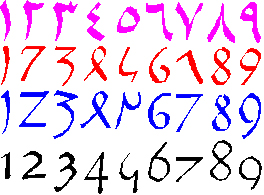Today's series: tulip => picture =>algorithm => drawing
al_Khowarazmi
The word “algorithm” has an interesting past. Here’s a quote from S. Schwartzman’s The Words of Mathematics:
| algorism (noun), algorithm (noun), algorist (noun): these words come from the now-quite-distorted name of a person, Ja’far Mohammed Ben Musa, who was known as al-Khowarazmi, meaning “the man from Khwarazm.” (In a similar way, Leonardo da Vinci was actually Leonard, a man from the town of Vinci). Around the year 825 al-Khowarazmi wrote an arithmetic book explaining how to use the Hindu-Arabic numerals. That book was later translated for Europeans and appeared with the Latin title Liber Algorismi, meaning “Book of al-Khowarazmi.” As a consequence, the term algorism came to refer to the decimal system of numeration. Any use or manipulation of Arabic numerals – especially a pattern used to add, subtract, multiply, etc. – was known as an algorism. Arithmetic itself was sometimes called algorism, and in a similar fashion Europeans who advocated the adoption of Hindu-Arabic numerals were known as algorists. Over the centuries the word algorism underwent many changes in form. In Old French it became augorisme, which then developed into the now obsolete English augrim, agrim, and agrum. The current form algorithm exhibits what the Oxford English Dictionary calls a “pseudo-etymological perversion”: it got confused with the word arithmetic (which was one of its meanings, and which has several letters in common with it); the result was the current algorithm. Current dictionaries still list the older form algorism in the sense of “the decimal or Arabic system of numeration.” |
| « Algorithm – but fun | <-- previous post | next post --> | Invented » |
|---|








